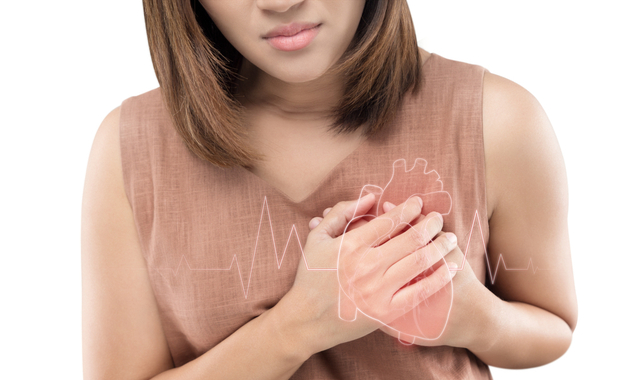
According to a 2016 study published in the journal Circulation[1], cardiovascular diseases (CVD) are the leading cause of morbidity and mortality in India. As per reports, a quarter of all deaths in the country can be attributed to CVD. A study in the Indian Heart Journal[2] has revealed that the prevalence of coronary artery disease in both men and women has increased from 3 to 10% in urban Indians.
Women, in comparison with men, tend to have a better risk factor profile at younger ages, but at an older age, the risk tends to increase as compared to men. Moreover, women are more likely to die after a first heart attack and for those who survive, the risk of a second attack, heart failure or death is higher as compared to men[2].
In this article, Dr. Santosh Kumar Dora, Senior Cardiologist, Asian Heart Institute, Mumbai explains the risk factors of heart disease unique to women along with tips to keep the heart healthy.
Risk Factors Of Heart Disease in Women
Before knowing about the risk factors of heart disease in women, it is important to know about the signs and symptoms of heart disease. While chest pain and breathlessness are common symptoms of a cardiac problem, there are other symptoms which should not be ignored. These include palpitations, giddiness, syncope, undue fatigue with minimal exertion, and swelling in the legs. Chest pain, which is one of the common symptoms during a heart attack, may be absent in some cases in women. Also, in women, the heart attack may sometimes present as excessive sweating, jaw pain, vomiting, and pain in the epigastric region (around the chest region).
The symptoms and causes of heart disease in women may be atypical. Let us become more aware of the causes of cardiovascular diseases in women.
Always Trust For Better Heart Care. Check Our Store Now!
The standard risk factors for coronary disease are diabetes, hypertension, smoking, dyslipidemia, family history of heart disease, and obesity. These risk factors are common to women as well as men. Although most risk factors for CAD are similar in men and women, gender differences have been seen. The common cardiac risk factors specific to women are gestational diabetes (diabetes during pregnancy), pregnancy-induced hypertension, polycystic ovarian syndrome, and early menopause.
Early menopause: Women who undergo menopause at an age younger than 44 years are known to be at a higher risk of suffering from cardiovascular disease. This is attributed to be due to low estrogen level post menopause, which is known to exert a protective effect on the heart. Also, studies[2] have shown that the level of high-density lipoprotein (HDL) is about 10 mg/dl higher in premenopausal women than in men, which is known to lower the risk of heart disease. But early menopause can lead affect cholesterol levels and increase the risk of heart disease in women. Moreover, as menopause approaches, women tend to become more intolerant towards carbohydrates and white sugar, which increases the risk of obesity, a key risk factor of heart disease in both men and women.
Gestational diabetes: If a woman develops diabetes during pregnancy for the first time, it is known as gestational diabetes. In some cases, women with gestational diabetes have normal blood glucose level post delivery. However, in some cases, there is a higher chance of a woman developing diabetes in subsequent years. And as known, diabetes is one of the key risk factors of heart disease. So if you have gestational diabetes, there is a higher risk of diabetes, which in turn ups the chance of heart disease in women. Hence, it is important to keep track of your diet and exercise regularly to lower your risk of diabetes and heart disease, especially during pregnancy.
**Consult India’s best doctors here**
Pregnancy-induced hypertension: Just like gestational diabetes, high blood pressure during pregnancy can also increase the risk of hypertension in the future. This is because high blood pressure puts pressure on the arteries which in turn affect the flow of blood to the heart. It can also lead to damage to the blood vessels increasing the risk of heart disease in women. Hence, it is advised to maintain optimal weight during pregnancy and also avoid excess intake of salt during this time as it can increase the blood pressure.
Polycystic ovarian syndrome (PCOS): It is a condition in which there is a hormonal imbalance which affects the women. This, in turn, can lead to conditions such as diabetes, metabolic syndrome, and other hormonal problems. Moreover, the syndrome causes higher than normal amounts of male hormones in women. This, in turn, impacts the protective effect of female hormones on the heart, increasing the risk of heart disease in women. This is why, it is advised to check blood pressure and cholesterol regularly and maintain a healthy weight by replacing the intake of saturated with unsaturated sources like nuts, olive oil. Also, ensure to go for daily brisk walks which improve blood flow to the heart and its function.
For all individuals, heart patients or not, it is essential that you follow a healthy diet, undergo a dynamic exercise regime regularly as well as annual health check-ups. The heart works continuously for us, without taking any breaks and therefore, a healthy lifestyle with a strict diet and regular exercise is needed for a to keep the heart healthy. Stay healthy, Stay happy!
(The article is reviewed by Dr. Lalit Kanodia, General Physician)
Recommended Reads:
Heart Disease In Women: 10 Things To Know About!
Heart Health: 5 Tips By A Cardiologist For A Healthy Heart
References:
1. Prabhakaran D, Jeemon P, Roy A. Cardiovascular Diseases in India: Current Epidemiology and Future Directions. Circulation. 2016 Apr 19;133(16):1605-20.
2. Pathak LA, Shirodkar S, Ruparelia R, Rajebahadur J. Coronary artery disease in women. Indian Heart J. 2017 Jul – Aug;69(4):532-538.